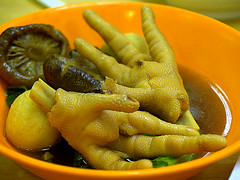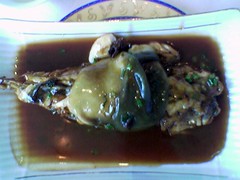August, 8, 2007
Following last night's Democratic forum in Chicago, where commerce in Asia was a subject of debate, presidential candidates might want to take a look at the results of a new Zogby survey on trade with China. Some key findings: 63 percent of Americans "would be likely to participate in a boycott of Chinese goods until the country implements stricter safety regulations"; 61 percent "would be more likely to purchase a product with a 'China Free' label." Finally: "The vast majority (89%) believes the U.S. government should put stronger pressure on China and other foreign countries to increase product quality and safety standards, while nearly as many (85%) would support the U.S. government imposing stronger criminal penalties and fines on U.S. importers who allow dangerous products to be imported from foreign countries."
These results are all the more striking because the survey was conducted July 17-19 -- "before the announcement of a massive recall of Chinese-made toys by Fisher-Price, but after a significant recall of Chinese-made railroad toys...[C]ompanies recalled the products because they contained excessive levels of lead on the toys and parts." With the Fisher-Price recall drawing further attention to product safety concerns, the proportion of Americans who distrust goods imported from China could grow even more.
If other polls confirm these results, it looks like 2008 could make international trade an important policy issue for Americans of all partisan stripes. With nearly nine in ten Americans worried about the quality of products coming into their country from overseas, proposals to get "tougher on China" (as Hillary Clinton put it last night) might be appealing to voters even outside traditionally China-wary labor audiences. Outsourcing has not proven to be an issue with universal appeal. But if the debate over China moves away from a discussion over whether free trade is good for the economy, and toward one about whether Chinese products are threatening Americans' safety, protectionist-leaning candidates would certainly benefit.
Candidates like Mitt Romney, who spoke about trade with Asia at the June 5 Republican debate in New Hampshire, might be positioned exactly backwards on the issue. "Asia has come out of poverty," Romney said. "They're consumers. We can sell products to them: medicines, technology, energy." Appealing as this proposition might sound, American voters may be less excited about selling products to Asia than they are uneasy about the products Asia's selling us.
-- Alexander Burns
DEFINITION chi-na-free adj. A term proposed for use on food labels to show that products are not made in China.
CONTEXT In light of recent health and safety scares regarding Chinese-made food and products, a U.S.-based company called Food for Health International has announced plans to put "China-free" stickers on its goods. The subtext: These products won't make you sick or have harmful contaminants like melamine.
USAGE Given recent recalls of items from toys to toothpaste, China-free labeling could catch on, though consumers would do well to remember that not all products from China are tainted and not all tainted products are from China.
Wednesday, September 5, 2007
Fearing China
Posted by
Blogmonger
at
11:08 PM
0
comments
![]()
The China-Free label movement is growing in South Korea
By Jane Han Staff Reporter
Next to the calories and nutrition details on the side of a food package, you may soon be looking at the words ``China-Free,'' as the labeling movement that debuted in the U.S. is quietly trickling into the local food and beverage industries.
The move, which was first triggered in June by a Utah-based health food company for consumer awareness, has stirred controversy that it may promote racism. But a rising number of American businesses, consumers and interest groups are welcoming the labeling method as Chinese food and other imports have recently been headline news for their unacceptable health and safety standards.
An online poll by U.S. news channel MSBNC showed that 77 percent of 9,865 people said they were in favor of the ``China-Free'' labeling since an at-a-glance sticker tells shoppers what they need to know right away, while only 7.7 percent said they were against it.
And with many local food makers noticing a similar trend against China-derived ingredients, more are focusing on marketing and delivering ``China-Free'' products to consumers.
Haitai Beverage said its May-released black bean tea sold more than 9.5 million bottles over the past four months thanks to its premium quality homegrown beans.
``Top grade ingredients are what we value most because once you lose consumers' trust, it's hard to regain it,'' said Haitai spokesman Park Dong-soo, adding that at times, it means losing a big profit margin. ``Chinese beans are much cheaper, but we're still relying on 100 percent Korean because we know the public demands this.
Posted by
Blogmonger
at
11:24 AM
0
comments
![]()





